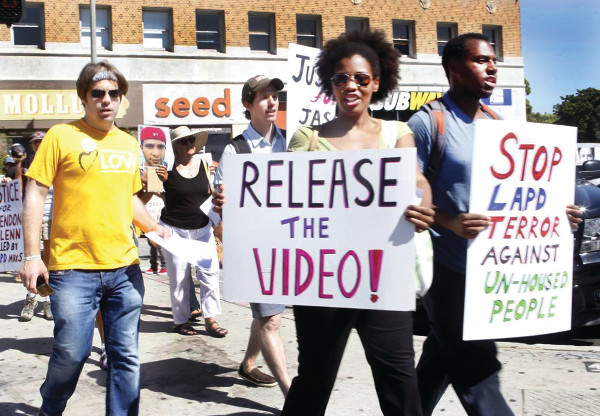
PHOTO/LYNN ROSSI
LOS ANGELES, CA — Homeless residents all over Los Angeles woke up on June 16 to the realization that their possessions, if left on the street for more than 24 hours, could be confiscated and sent to a location as far away as downtown Los Angeles for them to retrieve. The implementation of Los Angeles’ Municipal Code 56.11, which allows the confiscation of homeless possessions, is devastating to a growing, new section of discarded workers.
According to the National Law Center, every month 15,000 Los Angeles residents become homeless. In one area of the city, rumors have spread that the homeless are loaded onto busses and driven to San Pedro, however study after study indicates that 80% of the homeless previously had homes in the same area.
Homelessness is not caused by an invasion but instead by the replacement of workers by automation and the inability of this private property system to meet the needs of human beings. Families’ personal belongings, prescription medicine, their children’s school records and, perhaps most important, their personal identification are taken and discarded.
The devastation caused by Municipal Code 56.11 demands an understanding that a system based on private property necessarily defends the market and profit making by punishing those who it has no use for.
“Affordable housing in Los Angeles is almost non-existent,” says Mr. Smith, a resident of the city’s Skid Row community. Data suggests that the average two-bedroom unit in the city now costs more that $2600 per month to rent. “They’re building the tallest building in Los Angeles for a billion dollars and they’re going to spend a tenth of that on sheltering the homeless,” he adds. “So where’s the priority?”
“The de facto policy on homelessness in Los Angeles is enforcement and criminalization,” said Eric Ares, an organizer with the Los Angeles Community Action Network, a group on Skid Row that advocates for the homeless. Ares sees the mayor’s call for compassion as empty rhetoric that distracts attention from what the city could be doing. “At this point it’s no secret what the solution is: its housing and services,” Ares said. “But what we’re seeing—and this has been going on for at least 10 years, particularly in the gentrifying parts of Los Angeles—is a blank check for policing.”We live in a system that would rather destroy a family than provide the sustenance necessary to keep it together with food, clothing, and housing.
On the other hand, the battle over homelessness is fundamental to carrying on the fight for a new cooperative society. It is possible today to unite of a section of workers discarded by the economy. The basis for unity is the demand that the government provide housing for everyone who needs it.
